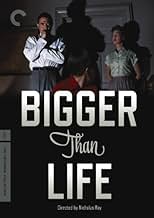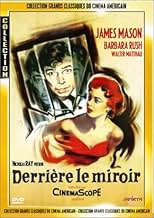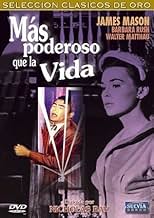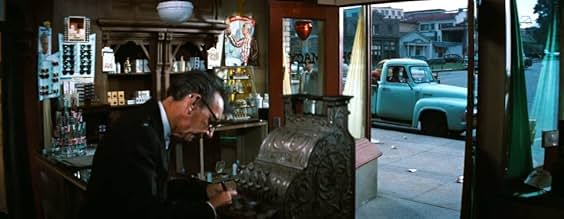NOTE IMDb
7,4/10
8,6 k
MA NOTE
Ajouter une intrigue dans votre langueA seriously-ill schoolteacher becomes dependent on a miracle drug that begins to affect his sanity.A seriously-ill schoolteacher becomes dependent on a miracle drug that begins to affect his sanity.A seriously-ill schoolteacher becomes dependent on a miracle drug that begins to affect his sanity.
- Réalisation
- Scénario
- Casting principal
- Récompenses
- 2 nominations au total
Robert F. Simon
- Dr. Norton
- (as Robert Simon)
David Bedell
- X-Ray Doctor
- (non crédité)
Gail Bonney
- Mother at PTA Meeting
- (non crédité)
Harold Bostwick
- Gentleman
- (non crédité)
Lovyss Bradley
- Churchgoer
- (non crédité)
Mary Carroll
- Mother at PTA Meeting
- (non crédité)
Virginia Carroll
- Mrs. Jones
- (non crédité)
Mary Carver
- Saleslady
- (non crédité)
Betty Caulfield
- Mrs. LaPorte
- (non crédité)
Avis à la une
James Mason produced the movie, suggesting to me that it was he who got this very noncommercial property filmed and released. It's a top-notch cast directed by cult favorite Nicholas Ray, but the material is a decided downer despite the originality. There were several films out at the time dealing with drug addiction (e.g. Hatful of Rain, Man with the Golden Arm). This, however, is the only one I know dealing with addiction to a prescription drug, Cortisone. Since similar attachments have spread over the decades, the theme has come to anticipate a more general social problem. Thus, its relevance carries over even for today's audiences.
Mason plays Ed Avery, a high-school teacher and normal family man. I like the way the screenplay works in the fact that he can't support a family on a teacher's income, and so has a second job as a cabbie. As a result, his day is filled from dawn to dusk. Small wonder, then, that he begins suffering blackouts, which doctors diagnose as a rare arterial disorder. (It's not made clear what has caused the problem. Overwork? Genetics?) A new drug, Cortisone, is prescribed for an indefinite period of usage. Up to now, Ed has been a friendly, well-liked family man and co-worker. So it's a harrowing trajectory to watch him go through increasingly intense periods of mental breakdown as a side effect of the new drug.
It's an excruciating descent into delusions of grandeur and megalomania, with few efforts at softening the agony. As the delusions mount, Ed abusively lectures a PTA meeting, berates and condemns his wife (Rush), becomes a Nazi-like taskmaster to his son (Olsen), and even tries to re-enact Abraham's sacrifice of son Isaac. Now, there were many so-called scary B- movies out at the time. But none, I believe, are any scarier than Mason's portrayal of the ravaged high-school teacher. Probably half the audience went home to check their medicine chest.
The only fault I find is with wife Lou's behavior. In my book, she's too passive to be believable in the face of the growing ordeal, especially as her son is affected. Ray brings out an unusual but expected degree of intensity in Mason's performance, with another of his trademarks centering on the action around the family staircase, perhaps symbolizing the mounting madness. Also, I wouldn't be surprised that Ray and Mason took a cut in pay to get the project made. The only concession to commercialism that I can spot is the expected 1950's ending, which nonetheless is more a relief than a disappointmenta tribute, I think, to the caliber of what's there on screen. Anyway, the movie comes across as an unusual and searing melodrama, prescient for its time.
Mason plays Ed Avery, a high-school teacher and normal family man. I like the way the screenplay works in the fact that he can't support a family on a teacher's income, and so has a second job as a cabbie. As a result, his day is filled from dawn to dusk. Small wonder, then, that he begins suffering blackouts, which doctors diagnose as a rare arterial disorder. (It's not made clear what has caused the problem. Overwork? Genetics?) A new drug, Cortisone, is prescribed for an indefinite period of usage. Up to now, Ed has been a friendly, well-liked family man and co-worker. So it's a harrowing trajectory to watch him go through increasingly intense periods of mental breakdown as a side effect of the new drug.
It's an excruciating descent into delusions of grandeur and megalomania, with few efforts at softening the agony. As the delusions mount, Ed abusively lectures a PTA meeting, berates and condemns his wife (Rush), becomes a Nazi-like taskmaster to his son (Olsen), and even tries to re-enact Abraham's sacrifice of son Isaac. Now, there were many so-called scary B- movies out at the time. But none, I believe, are any scarier than Mason's portrayal of the ravaged high-school teacher. Probably half the audience went home to check their medicine chest.
The only fault I find is with wife Lou's behavior. In my book, she's too passive to be believable in the face of the growing ordeal, especially as her son is affected. Ray brings out an unusual but expected degree of intensity in Mason's performance, with another of his trademarks centering on the action around the family staircase, perhaps symbolizing the mounting madness. Also, I wouldn't be surprised that Ray and Mason took a cut in pay to get the project made. The only concession to commercialism that I can spot is the expected 1950's ending, which nonetheless is more a relief than a disappointmenta tribute, I think, to the caliber of what's there on screen. Anyway, the movie comes across as an unusual and searing melodrama, prescient for its time.
Nicholas Ray was one of the greatest directors to come out of Hollywood. His movies are always about something and that something has a cinematic flair that makes the experience thought provoking and thoroughly entertaining. Here is Cortisone the excuse for a slap in the face of a society that was getting more complacent and more spoiled with an avalanche of "new" things coming to overwhelm our daily lives. "We're dull, we're all dull" tells James Mason to his wife. Barbara Rush is superb as a Donna Reed type with a monster in the house. James Mason, a few years away from Lolita, also produced this rarely seen classic and gives a performance of daring highs. Highly recommended to movie lovers everywhere.
How is it that I'd never heard of this movie before?
"Bigger Than Life" is a dream come true for those movie fans (I count myself among them) who love the decade of the 1950s for its total cinematic schizophrenia. I can't think of another decade that created whole omnibuses of films more strongly opposed to one another. It seems that half of the filmmakers of the 50s were churning out earnest Technicolor pap that tried to sell the American public a version of the 50s that simply didn't exist yet which everyone so desperately wanted to believe did, while the other half were making movies about everything that was wrong with the very version of America the other half was clinging to. If you're a fan of subtext in films, and especially interested in seeing how filmmakers could work within the conventions of a genre while turning those conventions against themselves, the 50s are your decade. And for the ultimate master of subtext, look no further than Nicholas Ray.
There isn't a Ray film I've seen that isn't dripping in subtext, socio-political, sexual, gender-based, you name it. "Bigger Than Life" stars a towering James Mason as a family man who's turned into a literal monster when he becomes addicted to a drug that helps keep a life-threatening medical problem at bay. The film goes to some jaw-dropping places, especially toward the end, as Mason's character evolves from protector to worst nightmare and the picture-perfect family life depicted in the earlier parts of the film dissolve before our very eyes. However, Ray's point all along is that that picture-perfect family never really existed in the first place, and the drug on which Mason gets hooked brings out the "id" in him and the family dynamic that's been lurking there all along.
Ray was the rare director who could make the saturated Technicolor and massive Cinemascope aspect ratios of 1950s filmmaking work to his advantage and serve his artistic purposes, rather than simply be used to photograph pretty gowns and landscapes. In fact, despite its Cinemascope grandeur, "Bigger Than Life" is all about cramped interiors -- offices, bedrooms, one's own feverish mind -- and the skeletons in the closets, real and imagined, that are hiding there.
Grade: A
"Bigger Than Life" is a dream come true for those movie fans (I count myself among them) who love the decade of the 1950s for its total cinematic schizophrenia. I can't think of another decade that created whole omnibuses of films more strongly opposed to one another. It seems that half of the filmmakers of the 50s were churning out earnest Technicolor pap that tried to sell the American public a version of the 50s that simply didn't exist yet which everyone so desperately wanted to believe did, while the other half were making movies about everything that was wrong with the very version of America the other half was clinging to. If you're a fan of subtext in films, and especially interested in seeing how filmmakers could work within the conventions of a genre while turning those conventions against themselves, the 50s are your decade. And for the ultimate master of subtext, look no further than Nicholas Ray.
There isn't a Ray film I've seen that isn't dripping in subtext, socio-political, sexual, gender-based, you name it. "Bigger Than Life" stars a towering James Mason as a family man who's turned into a literal monster when he becomes addicted to a drug that helps keep a life-threatening medical problem at bay. The film goes to some jaw-dropping places, especially toward the end, as Mason's character evolves from protector to worst nightmare and the picture-perfect family life depicted in the earlier parts of the film dissolve before our very eyes. However, Ray's point all along is that that picture-perfect family never really existed in the first place, and the drug on which Mason gets hooked brings out the "id" in him and the family dynamic that's been lurking there all along.
Ray was the rare director who could make the saturated Technicolor and massive Cinemascope aspect ratios of 1950s filmmaking work to his advantage and serve his artistic purposes, rather than simply be used to photograph pretty gowns and landscapes. In fact, despite its Cinemascope grandeur, "Bigger Than Life" is all about cramped interiors -- offices, bedrooms, one's own feverish mind -- and the skeletons in the closets, real and imagined, that are hiding there.
Grade: A
This film, much like the melodramas of Douglas Sirk, has far more going on than meets the eye. James Mason's character, after getting whacked out of Cortizone (a "Miracle Drug") indeed becomes hysterical and abusive. But he was made ill in the first place by the strain caused his intensely driven lifestyle, where he kept two jobs to finance his family's social and financial ascent.
What the viewer has to watch for is what his character says during his cortizone-induced delusions. His criticisms of his wife, kid, PTA and society in general are over-the-top, but essentially valid. It's a classic narrative device: by allowing a main character a way out of societal responsibility and place (In this case, being bombed on Cortizone), he is allowed to comment on and criticize American society directly without actually threatening the status quo. and in the case of 1950s America, that's a monolithic status quo to criticize.
What the viewer has to watch for is what his character says during his cortizone-induced delusions. His criticisms of his wife, kid, PTA and society in general are over-the-top, but essentially valid. It's a classic narrative device: by allowing a main character a way out of societal responsibility and place (In this case, being bombed on Cortizone), he is allowed to comment on and criticize American society directly without actually threatening the status quo. and in the case of 1950s America, that's a monolithic status quo to criticize.
James Mason becomes "Bigger than Life" in this 1956 Nicholas Ray film that also stars Barbara Rush and Walter Matthau. Mason plays Ed Avery, a schoolteacher who also is a part-time cab dispatcher. He is suffering from severe spasms that are getting worse.
Ed learns that he has a terminal illness that perhaps can be cured with a steroid, cortisone. He is helped, but he also begins to suffer from mood swings and depression and, as he takes more and more, veers completely out of control. Barbara Rush plays his suffering wife, and Walter Matthau is a family friend and coworker.
I actually had a family member who went into profound depressions because of continuing to take black market cortisone, so this film resonated with me. Mason, who produced the film, is terrifying. Barbara Rush is very good, though her character puts up with an awful lot before she makes a move. Matthau is good in a supporting role, but roles showcasing his true strengths as an actor were a few years away.
This is much more than a cautionary tale about steroids, which need to be taken and tapered off very carefully. In his cortisone-induced mindset, Ed Avery spouts off on the problems in society, very unusual in the repressed '50s. His ideas are a tad over the top, but there's a good kernel in them. Ray always did well with a rebellious mindset.
Ed learns that he has a terminal illness that perhaps can be cured with a steroid, cortisone. He is helped, but he also begins to suffer from mood swings and depression and, as he takes more and more, veers completely out of control. Barbara Rush plays his suffering wife, and Walter Matthau is a family friend and coworker.
I actually had a family member who went into profound depressions because of continuing to take black market cortisone, so this film resonated with me. Mason, who produced the film, is terrifying. Barbara Rush is very good, though her character puts up with an awful lot before she makes a move. Matthau is good in a supporting role, but roles showcasing his true strengths as an actor were a few years away.
This is much more than a cautionary tale about steroids, which need to be taken and tapered off very carefully. In his cortisone-induced mindset, Ed Avery spouts off on the problems in society, very unusual in the repressed '50s. His ideas are a tad over the top, but there's a good kernel in them. Ray always did well with a rebellious mindset.
Le saviez-vous
- AnecdotesThe main manufacturers of cortisone at the time, Merck in the US and Glaxo in the UK, were worried about the impact of this film on the public and their willingness to take the drug if prescribed by their physician. However, by the time of this film's release, newer and better formulations of the drug, along with greater knowledge of its uses and limitations had reduced (but not eliminated) the side-effects experienced by Ed in this film.
- GaffesWhen Ed has a barium X-ray, the image of the swallowed fluid is anatomically inaccurate. The fluid falls straight down to an extremely large "stomach" in his groin area.
Meilleurs choix
Connectez-vous pour évaluer et suivre la liste de favoris afin de recevoir des recommandations personnalisées
- How long is Bigger Than Life?Alimenté par Alexa
Détails
- Date de sortie
- Pays d’origine
- Langues
- Aussi connu sous le nom de
- Bigger Than Life
- Lieux de tournage
- Société de production
- Voir plus de crédits d'entreprise sur IMDbPro
Box-office
- Budget
- 1 000 000 $US (estimé)
- Durée1 heure 35 minutes
- Couleur
- Rapport de forme
- 2.55 : 1
Contribuer à cette page
Suggérer une modification ou ajouter du contenu manquant

Lacune principale
By what name was Derrière le miroir (1956) officially released in India in English?
Répondre






























